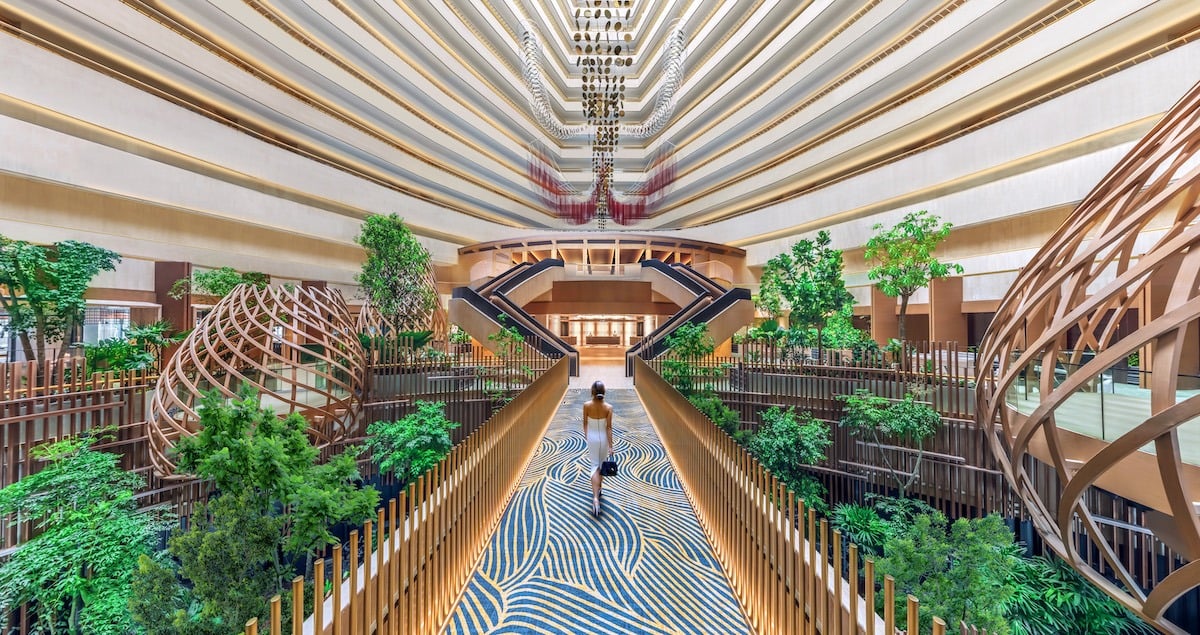The hospitality industry, a sector built on the timeless principles of service and comfort, is standing at the precipice of its most significant transformation yet. For centuries, the core offering remained relatively unchanged: a clean bed, a safe environment, and a welcoming smile. Today, however, that foundation is being reshaped by a confluence of powerful forces. The digital revolution, shifting consumer expectations, and a global call for sustainability are not merely trends; they are the tectonic plates moving beneath the industry, forging a new landscape where the very definition of a “guest experience” is being rewritten.
This evolution is not just about adopting new gadgets or adding superficial perks. It is a fundamental paradigm shift from providing a transactional service to curating a deeply personal, seamless, and memorable journey. The hotel of the future is no longer a passive space for travelers to rest their heads. It is an active participant in their journey—an intuitive, responsive, and conscious entity that anticipates needs, delights with surprises, and reflects the values of its guests. For operators, navigating this new era is both a daunting challenge and an unprecedented opportunity. Those who cling to the old ways risk becoming relics, while those who embrace this change will not only survive but thrive, building brands that resonate on a much deeper level and command unwavering loyalty. This article explores the core pillars of this transformation, delving into the technologies, philosophies, and strategies that are shaping the future of hospitality.

The Technological Infusion: Smart Hotels and Seamless Journeys
Technology is undoubtedly the primary engine driving change in the hospitality sector. It is the invisible scaffolding upon which the future of guest experiences is being built. The goal is not technology for its own sake, but the strategic implementation of systems that eliminate friction, enhance personalization, and empower staff to deliver a higher level of service. This technological infusion can be broken down into several key domains.
A. Artificial Intelligence (AI) and Machine Learning (ML) Artificial Intelligence is the new central nervous system for hotel operations. Its ability to analyze vast datasets and make intelligent predictions is revolutionizing everything from marketing to in-room service. AI-powered chatbots and virtual assistants are now available 24/7, handling routine inquiries like Wi-Fi passwords, room service orders, and spa bookings with instant efficiency. This frees up human staff to manage more complex, high-touch guest interactions that require emotional intelligence. Furthermore, AI-driven dynamic pricing algorithms analyze market demand, competitor pricing, and even local events in real-time to optimize room rates, maximizing revenue while offering fair value to the guest. In the background, machine learning models analyze guest preferences and past behavior to create hyper-personalized marketing campaigns, suggesting packages or amenities that a specific guest is highly likely to enjoy on their next visit.
B. The Internet of Things (IoT) The concept of the “smart room” is no longer science fiction; it is a rapidly emerging reality powered by the Internet of Things. IoT involves a network of interconnected devices that communicate with each other to create a responsive and intuitive environment. For guests, this translates to an unparalleled level of comfort and control. Imagine a room where the thermostat automatically adjusts to your preferred temperature upon check-in, the lighting gradually brightens in the morning to simulate a natural sunrise, and the curtains open with a simple voice command. Guests can use their smartphones or in-room tablets to control every aspect of their environment, order services, and communicate with the front desk. For operators, IoT offers immense benefits in operational efficiency. Smart sensors can trigger alerts for predictive maintenance on an HVAC unit before it fails, monitor energy consumption to reduce utility costs, and even notify housekeeping when a room becomes vacant, optimizing cleaning schedules.
C. Robotics and Automation While the idea of a fully robotic staff is still far off, targeted automation and robotics are already making a significant impact. Robotic process automation (RPA) is streamlining back-office tasks like data entry and invoice processing, reducing errors and freeing up administrative staff. In the guest-facing domain, we see the rise of delivery robots that can transport luggage, deliver extra towels, or bring a late-night snack directly to a guest’s room, operating quietly and efficiently. Some innovative hotels are even experimenting with robotic arms in their bars to mix perfect cocktails or automated systems in the kitchen for basic food preparation, ensuring consistency and speed. The key is to deploy robotics for tasks that are repetitive, mundane, or logistical, thereby allowing human employees to focus on what they do best: creating genuine connections and providing empathetic service.
D. Contactless and Mobile-First Technologies The global pandemic acted as a massive accelerator for the adoption of contactless technology. What began as a safety measure has now become a standard expectation for convenience. The modern guest journey begins on a smartphone. Mobile check-in allows guests to bypass the front desk entirely, proceeding directly to their room and using their phone as a digital key. In the room, QR codes have replaced printed menus and directories, offering instant access to hotel services, restaurant bookings, and local guides. Mobile payment solutions are now standard, from settling the final bill to paying for a drink at the pool bar. This mobile-first approach not only enhances convenience and safety but also provides hotels with a direct communication channel to their guests, allowing them to send personalized offers and important updates throughout their stay.
The New Gold Standard: Hyper-Personalization and Experiential Stays
While technology provides the tools, the ultimate goal is to craft an experience that feels uniquely tailored to each individual. The modern traveler, particularly from the Millennial and Gen Z demographics, is no longer satisfied with a generic, one-size-fits-all approach. They crave authenticity, connection, and experiences over mere possessions.
A. Beyond Basic Personalization For years, personalization in hospitality meant adding a guest’s name to a welcome email. Hyper-personalization goes infinitely deeper. It leverages data—from pre-arrival surveys, past stay history, and even publicly available social media preferences—to curate a bespoke stay. It’s about knowing that a guest prefers a foam pillow, enjoys a specific brand of sparkling water, is interested in modern art, or is celebrating an anniversary. This knowledge allows the hotel to proactively delight the guest. The mini-bar is stocked with their favorite drink, tickets to a nearby art exhibition are suggested upon arrival, and a complimentary bottle of champagne appears in the room to celebrate their special occasion. This level of anticipatory service transforms a good stay into an unforgettable one and is the single most powerful driver of guest loyalty.
B. The Rise of Experiential Travel Today’s travelers want to do more than just see a place; they want to live it. Hotels are evolving from being just a base of operations into becoming gateways to authentic local culture and unique experiences. This means offering more than a list of nearby attractions. It involves curating exclusive experiences that guests can’t find on their own. This could be a private cooking class with a renowned local chef, a guided historical tour led by a university professor, an early-morning yoga session on a scenic rooftop, or a behind-the-scenes visit to a local artisan’s workshop. By integrating the local community and culture into their offerings, hotels become storytellers, providing guests with a narrative and a set of memories that last long after they check out.
C. Wellness as a Core Pillar The focus on mental and physical well-being has become a central part of modern life, and travel is no exception. Hospitality is responding by integrating wellness into every facet of the guest experience. This goes far beyond simply having a gym and a spa. It encompasses everything from rooms designed with circadian rhythm lighting to promote better sleep, to menus featuring locally sourced, nutritious options, and dedicated spaces for meditation and mindfulness. Some hotels are offering in-room fitness equipment, partnerships with apps like Calm or Headspace, and wellness-focused retreats that include everything from digital detoxes to guided nature hikes. The hotel of the future is not just a place to stay, but a place to rejuvenate and recharge.

The Green Imperative
In an era of increasing climate consciousness, sustainability is no longer a niche preference but a core expectation. Travelers are actively seeking out brands that align with their values, and a hotel’s environmental and social policies are now a significant factor in their booking decisions. This has pushed sustainability from a “nice-to-have” corporate social responsibility initiative to a fundamental pillar of brand identity and operational strategy.
A. Eco-Conscious Operations The foundation of hospitality sustainability lies in minimizing the environmental footprint. This involves a multi-pronged approach to resource management. Advanced energy management systems, powered by IoT sensors, optimize heating, cooling, and lighting, drastically reducing electricity consumption. Water conservation is achieved through low-flow fixtures, greywater recycling systems, and linen and towel reuse programs that are effectively communicated to guests. Waste reduction is another critical area, with hotels implementing comprehensive recycling and composting programs, eliminating single-use plastics, and partnering with organizations to donate surplus food.
B. Sustainable and Ethical Sourcing A commitment to sustainability extends deep into the supply chain. This means prioritizing local suppliers for food and beverages, which not only reduces transportation emissions but also supports the local economy and provides guests with a fresher, more authentic culinary experience. It also involves sourcing linens, amenities, and furniture from companies that adhere to ethical labor practices and use sustainable materials. Communicating these stories to guests—explaining where the food comes from or the story behind the recycled materials used in the hotel’s design—adds a layer of depth and transparency that modern consumers appreciate.
C. Building a Culture of Responsibility True sustainability is about more than just operational changes; it’s about fostering a culture of environmental stewardship that involves both staff and guests. This includes training staff on green practices, empowering them to find new ways to reduce waste, and creating programs that allow guests to participate. This could be anything from offering loyalty points for forgoing housekeeping services to organizing opportunities for guests to volunteer in local conservation projects. When a hotel can demonstrate an authentic, holistic commitment to the planet, it builds a powerful and positive brand reputation that attracts like-minded travelers.
The Human Touch in a High-Tech World
With the rise of automation and AI, a common fear is that the human element of hospitality will be lost. However, the most forward-thinking leaders in the industry see it differently. They believe that technology’s greatest role is to handle the mundane and repetitive, thereby liberating human staff to focus on what they do best: providing genuine empathy, creative problem-solving, and building meaningful connections.
The role of the hotel employee is evolving from a transactional service provider to an expert experience curator. The front desk agent is no longer just a clerk who hands over a key; they are a local ambassador who can offer personalized recommendations based on a guest’s interests. The concierge is not just a booking agent but a “dream weaver” who can arrange complex, multi-part experiences. This requires a new set of skills. Soft skills like emotional intelligence, active listening, creative thinking, and cultural awareness are becoming more valuable than purely technical abilities. The future of hotel service is not high-tech versus high-touch; it is a symbiotic relationship of “high-tech enabling high-touch.” The technology handles the logistics, while the people create the magic.
Conclusion
The future of hospitality is a dynamic and exciting landscape, one that is more complex, intelligent, and guest-centric than ever before. It is a future defined by a seamless blend of digital efficiency and profound human connection. The hotels that will lead this new chapter are those that view technology not as a replacement for people, but as a tool to empower them. They are the ones who leverage data to understand their guests on a deep, personal level and use those insights to craft unique, memorable, and meaningful experiences. They are the brands that operate with a conscience, demonstrating a genuine commitment to the planet and their communities. The journey ahead requires vision, agility, and a relentless focus on the guest. For those who embrace this evolution, the reward will be the creation of a new generation of hospitality that is not only smarter and more efficient but also more human, more sustainable, and more inspiring than ever before.









